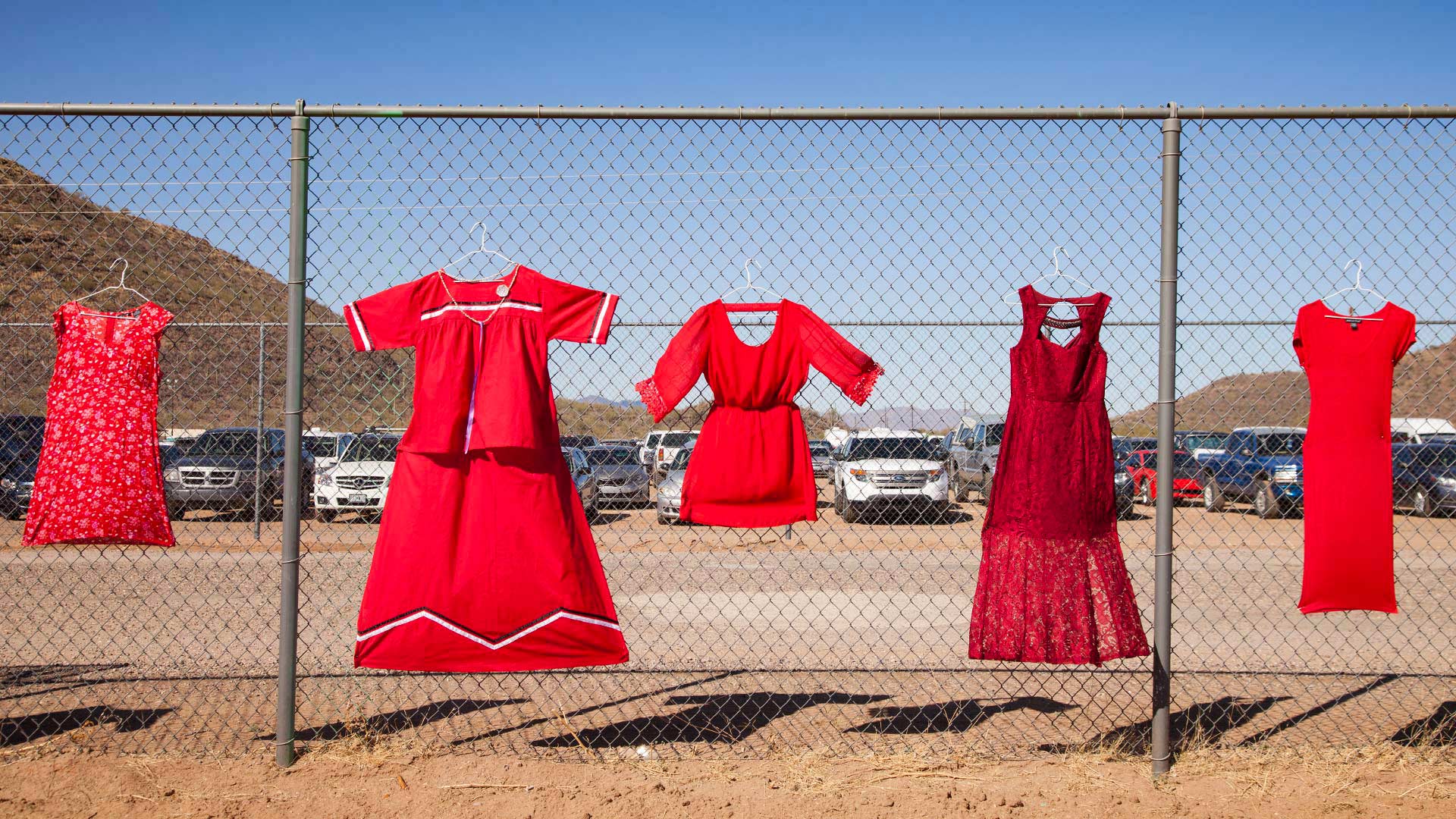 Red dresses representing missing and murdered Indigenous women, displayed at the Verna N. Enos Toka Field on the Tohono O'odham Nation, 2018.
Red dresses representing missing and murdered Indigenous women, displayed at the Verna N. Enos Toka Field on the Tohono O'odham Nation, 2018.
ALBUQUERQUE, N.M. — The U.S. Justice Department will double the funding it gives tribes for public safety programs and crime victims as it tries to tackle the high rates of violence against Native American women, a top official said.
The department's third-highest ranking official said more than $113 million in public safety funding will be doled out to 133 tribes and Alaska Native villages to try to address the issue.
An additional $133 million will be awarded in the coming weeks to tribes to help Native American crime victims, Jesse Panuccio, principal deputy associate attorney general, announced Wednesday in Santa Fe.
The announcement comes after a series of stories by The Associated Press helped put an increased focus on the deaths and disappearances of Native American women and girls. Panuccio noted that tribal leaders have called for more robust investigations into those cases and human trafficking.
"We recognize the serious nature of the problem we're facing, and we are trying, through a variety of strategies — both through the funding and the use of our own prosecutors and building up awareness — to address these issues," Panuccio said.
For decades, tribes largely had been unable to directly access money in a U.S. program aimed at supporting crime victims nationwide — even as federal figures showed more than half of Native American women faced sexual or domestic violence at some point in their lives. On some reservations, Native American women are killed at a rate more than 10 times the national average.
Figures at the end of 2017 showed a disproportionate number of Native women listed as missing. Based on figures obtained from an FBI database, AP found this month 633 open missing person cases for Native American women, who make up 0.4 percent of the U.S. population but 0.7 percent of cases overall.
African-American women were the only other group to be overrepresented in the caseload compared with their proportion of the population.
The Justice Department funding increase follows years of congressional efforts to fix a system that many say has left Native American women especially vulnerable to violent crime.
Legal experts and victims' advocates blame underfunded police departments that lack the resources to investigate crimes and lingering jurisdictional gaps among federal, tribal and local law enforcement agencies that often result in cases going unprosecuted.
A series of congressional proposals are trying address how authorities' handle and track reports of missing women on reservations.
A law proposed by U.S. Sen. Heidi Heitkamp, a North Dakota Democrat, aims to establish protocols for handling cases of missing and murdered Native Americans. It also would require annual reports to Congress on the number of missing and murdered Native American women, saying accurate statistics could potentially help authorities detect patterns and solve more cases.
A measure to expand the Violence Against Women's Act calls for similar proposals and for amending laws to give tribes authority to prosecute non-Native Americans suspected of selling tribal members for sex or running human trafficking rings. The U.S. Senate voted Tuesday to extend the law in its current form for two more months, delaying proposals to expand it.
"There is still much work to do," Heitkamp said.
The Justice Department has not expressed support or opposition to further expanding tribal jurisdiction over non-Native Americans. Now, tribes are able to prosecute people who aren't tribal members only in assault cases where the victim is a woman and knows her assailant.
Panuccio said the department's approach to tackling violence against Native American women focuses on partnering with tribes to assign more special prosecutors capable of handling cases in federal and tribal courts and supporting tribal law enforcement and victims.
The special prosecutors are being tasked with handling sexual assault, domestic and dating violence, and stalking cases — as well as sex trafficking cases where any of those other crimes are involved, he said.
Juana Majel-Dixon, co-chairwoman of a National Congress of American Indians' taskforce established to address violence against women, welcomes the increase in funding that she and others spent years advocating for, though she still questions whether the money will stretch far enough.
"When you think about the enormity of [the number of] victims we're talking about, the money being provided has been graciously received," she said. "But it's not enough."

By submitting your comments, you hereby give AZPM the right to post your comments and potentially use them in any other form of media operated by this institution.